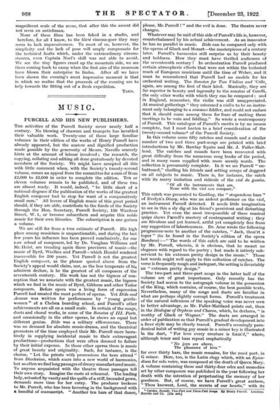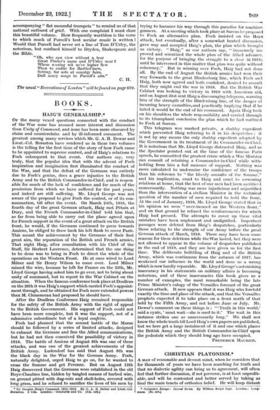M U S IC.
PURCELL AND HIS NEW PUBLISHERS.
Tim activities of the Purcell Society cover nearly half a century. No blowing of shawms and trumpets has heralded their valuable work. Twenty-one of those large familiar volumes in their edition of the works of Henry Purcell have already appeared, but the austere and dignified production made possible by the generosity of Messrs. Novello scarcely hints at the amount of labour involved ; the research, the copying, collating and editing all done gratuitously by devoted members of the Society. We might have accepted all this with little comment when, with the Society's twenty-second volume, comes an appeal from the committee for a sum of from £2,000 to £3,000 in order to complete the edition. Ten or eleven volumes remain to be published, and of these two are almost ready. It would, indeed, " be little short of a national disgrace if the publication of the works of the greatest English composer had to stop for want of a comparatively small sum." All lovers of English music of this great period should, if they are able, contribute to the funds of the Society through the Hon. Secretary, Purcell Society, 150 Wardour Street, W. 1, or become subscribers and acquire this noble music for their own libraries. The subscription is one guinea a volume.
We are still far from a true estimate of Purcell. His high place among musicians is unquestionable, and during the last few years his influence has been proved conclusively, for our naw school of composers, led by Dr. Vaughan Williams and Mr. Hoist, are treading again those provinces of music—the music of Byrd, Weelkes and Purcell—which Handel rendered inaccessible for 200 years. Yet Purcell is not the greatest English composer, as the phrase quoted above from the Society's appeal would claim, nor, as the less temperate of his admirers declare, is he the greatest of all composers of the seventeenth century. His work has not the bigness of con- ception that we associate with the greatest music, the bigness which we find in the music of Byrd, Gibbons and other Tudor composers. Before opera was a living form of expression Purcell had created the most perfect of operas. Yet Dido and Aeneas was written for performance by " young gentle- women " at a Chelsea boarding school, and Purcell's other achievements are all on a small scale. In certain of the songs, duets and choral works, in some of the Sonatas of III. Parts, and occasionally in the other operas, he shows an equal but different genius. Dido was a solitary efflorescence. There was no demand for absolute music-drama, and the theatrical promoters of the time employed their Mr. Purcell more lucra- tively in supplying incidental music to their extravagant productions—productions that were often doomed to failure by their initial expense. In those other operas there is music of great beauty and originality. Such, for instance, is the chorus, " Let the priests with processions the hero attend " from Dioclesian, which soars into a new world of harmonies, but as often we find long passages of dreary manufactured music. To anyone acquainted with the theatre those passages tell their own story. Imagine the caste at rehearsal. The leading lady, actuated by vanity and the quills of a stiff, brocaded gown, demands more time for her entry. The producer beckons to Mr. Purcell, who has been hovering in the background with a handful of manuscript. " Another ten bars of that dance,
please, Mr. Purcell ! " and the evil is done. The theatre never changes.
Whatever may be said of this side of Purcell's life is, however, counterbalanced by his actual achievement. As an innovator he has no parallel in music. Dido can be compared only with the operas of Gluck and Mozart—the masterpieces of a century later. Purcell's harmonics still surprise us by their beauty and boldness. How they must have thrilled audiences of the seventeenth century ! In orchestration Purcell produced certain atmospheric effects that were not within the technical reach of European musicians until the time of Weber, and it must be remembered that Purcell had no models for his orchestral writing. The Sonatas for Two Violins and 'Cello, again, are among the first of their kind. Musically, they are far superior in beauty and ingenuity to the sonatas of Corelli, the only other works with which they can be compared : and in England, remember, the violin was still unappreciated. At musical gatherings " they esteemed a violin to be an instru- ment only belonging to a common fiddler, and could not endure that it should come among them for fcare of making these meetings to be vain and fiddling." So wrote a contemporary of Purcell. This catalogue of Purcell's merits is by no means complete, but I must hasten to a brief consideration of the twenty-second volume* of the Purcell Society.
In this volume some fifty catches and rounds and a similar number of two and three part-songs are printed with brief introductions by Mr. Barclay Squire and Mr. J. Fuller-Mait- land. The catches and rounds have been recovered with great difficulty from the numerous song books of the period, and in many cases supplied with more seemly words. The collection is presumably complete. In it we see Purcell " un- buttoned," chaffing his friends and setting scraps of doggerel on all subjects to music. There is, for instance, the catch with its merry imitation and ridicule of the viol da gamba.
" Of all the instruments that are,
None with the viol can compare,"
This catch was presented to Gostling, the " stupendous bass " of Evelyn's Diary, who was an ardent performer on the viol, an instrument Purcell detested. It needs little imagination to see in this a sly dig at his friend's persistent and disturbing practice. Yet even the most irresponsible of these musical quips shows Purcell's mastery of contrapuntal writing ; they are frivolous and yet learned, artful yet completely free from any suggestion of laboriousness. Dr. Arne wrote the following programme-note to another of the catches, " Jack, thou'rt a toper " (to be found in the Society's edition of the opera Bonduca) :—" The words of this catch are said to be written by Mr. Purcell, wherein, it is obvious, that he meant no elegance with regard to the poetry ; but made it intirely sub- servient to his extream pretty design in the music." Those last words might well apply to this collection of catches. The verse is frequently rough and inelegant, the setting is invariably an " extream pretty design."
The two-part and three-part songs in the latter half of the volume are of great importance. Only recently has the Society had access to the autograph volume in the possession of the King, which contains, of course, the best possible texts. Nevertheless, many of the songs and duets are familiar in what are perhaps slightly corrupt forms. Purcell's treatment of the natural inflexions of the speaking voice was never seen to better advantage, as Mr. Fuller-Maitland points out, than in the Dialogue of Orpheus and Charon, which, he declares, " is worthy of Cluck or Wagner." The duets are arranged in order of publication so that Purcell's gradual development into a freer style may be clearly traced. Purcell's seemingly para- doxical habit of writing gay music in a minor key is illustrated in the duet, " For love every creature is form'd," where, although tenor and bass repeat emphatically
"No joys are above, The pleasures of love " for over thirty bars, the music remains, for the most part, in G minor. Here, too, is the Latin elegy which, with an Epice- dium for solo voice, was composed at the death of Queen Mary. A volume containing these and thirty-four odes and monodies set by other composers was published in the year following her death with the intention of perpetuating the memory of her goodness. But, of course, we have Purcell's great anthem, " Thou knowest, Lord, the secrets of our hearts," with its • Catches, Rounds, Two-Part and Three-Part Sonya -By Henry Purcell. London' • Novella and Co. [25s. nett
accompanying" flat mournful trumpets " to remind us of that national outburst of grief. With one complaint I must close this beautiful volume. How frequently worthless is the verse to which much of Purcell's best secular music is written I Would that Purcell had never set a line of Tom D'Urfey, the notorious, but confined himself to Dryden, Shakespeare and the Bible.
" Oh, who can view without a tear
Great Pindar's name and D'Urfey near ? Whose roaring wit ne'er higher flew
Than to endite for l3arthol mew, Setting, for sots at country fairs, Dull saucy songs to Purcell's airs."
C. II.
The usual "Recreations of L9ndon" will be found on page 979.











































 Previous page
Previous page